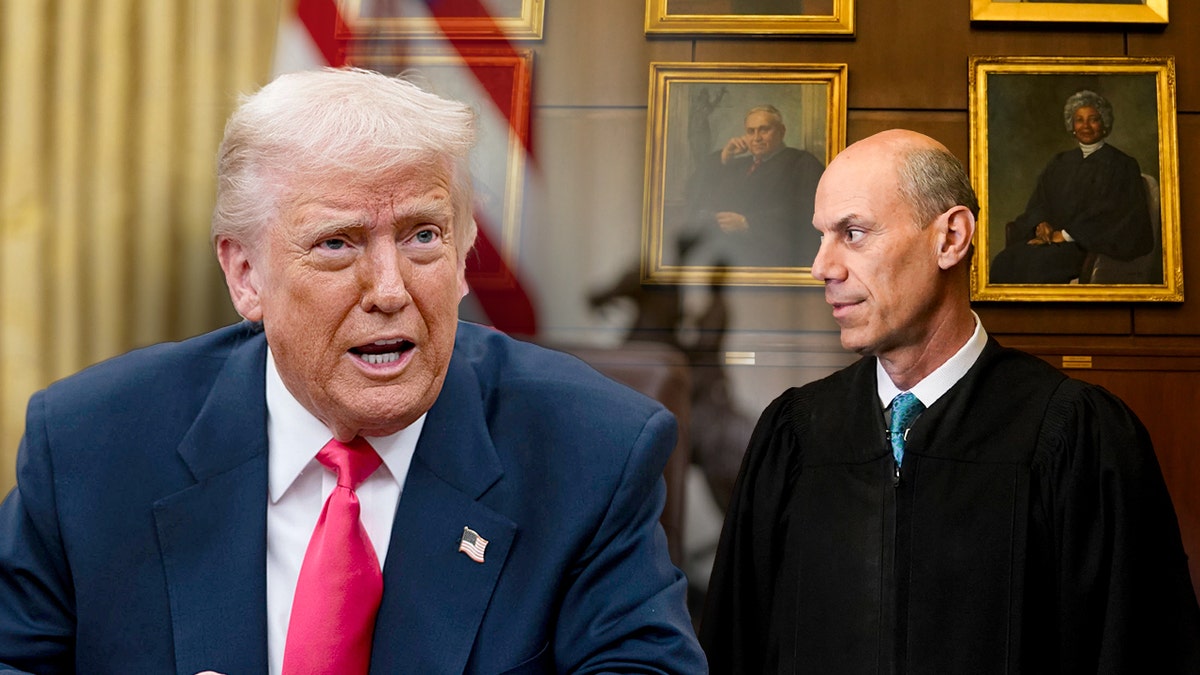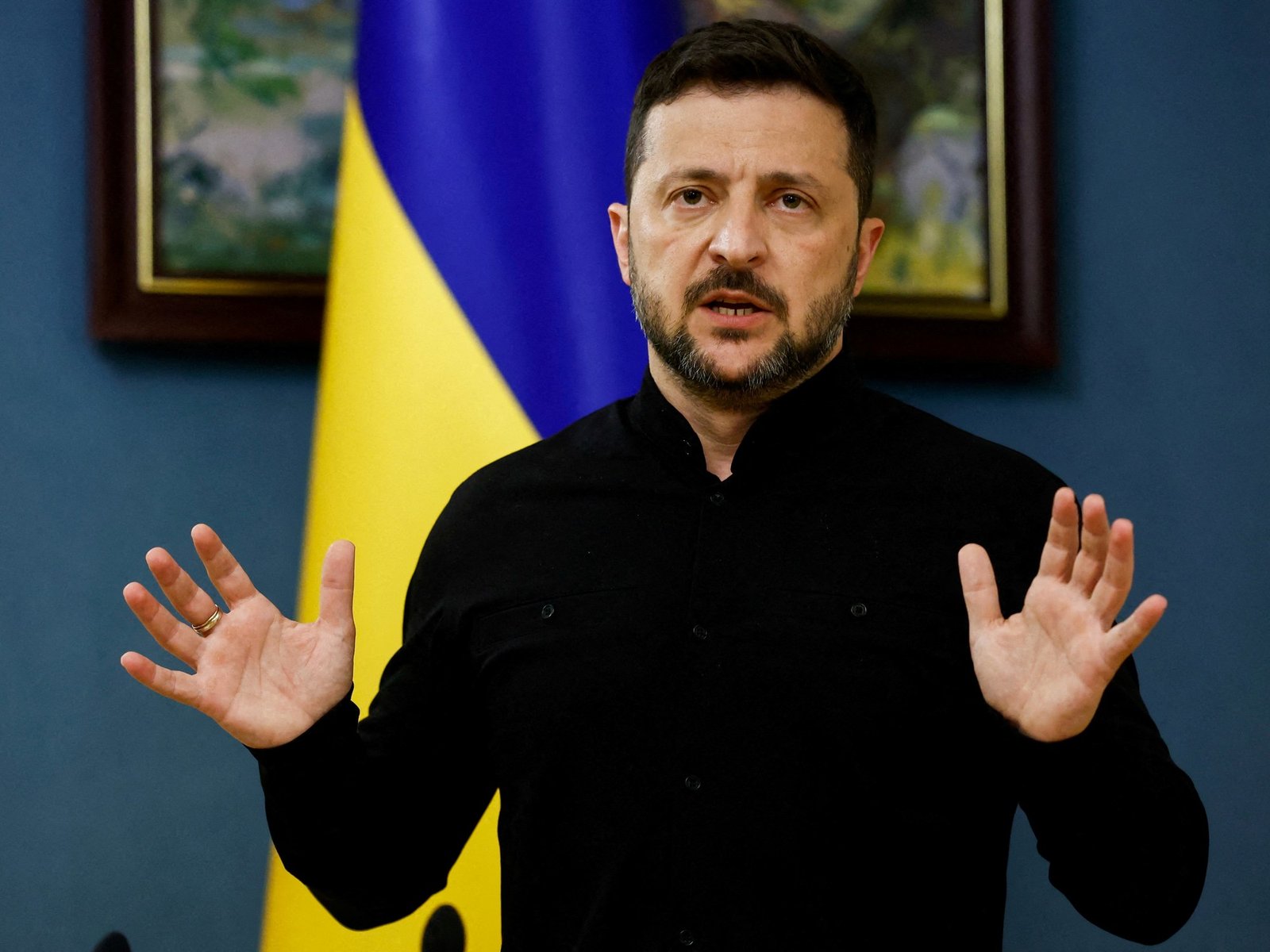INTERNACIONAL
Supreme Court grants Trump request to lift stay halting Venezuelan deportations

The Supreme Court on Monday granted President Donald Trump’s request to vacate a lower court’s ruling barring the administration from using a 1798 wartime immigration law to immediately deport Venezuelan nationals – including alleged members of the Tren de Aragua gang – from the U.S., marking a significant victory for the administration as it advances key immigration priorities.
Justices on the high court ruled 5-4 to grant the administration’s request to lift the stay, in a temporary victory for Trump and his allies.
At issue was the Alien Enemies Act, or the immigration law passed by Congress in 1789 to immediately remove certain migrants from U.S. soil.
Prior to Trump’s second White House term, it had been invoked just three times in U.S. history: During the War of 1812, during World War I, and most recently, World War II.
JUDGE BOASBERG POISED TO HOLD TRUMP ADMIN IN CONTEMPT, TAKES DOWN NAMES OF DHS OFFICIALS: ‘PRETTY SKETCHY’
Lawyers for the Trump administration had urged the court to vacate the lower court ruling, arguing in a Supreme Court filing that the lower court orders «rebuffed» their immigration agenda, including their ability «to protect the Nation against foreign terrorist organizations and risk debilitating effects for delicate foreign negotiations.»
Supreme Court Justices posing for an official photo at the Supreme Court. (Photo by OLIVIER DOULIERY/AFP via Getty Images)
«Today’s a bad day to be a terrorist in the United States of America,» Homeland Security Secretary Kristi Noem said in a video posted to X, adding that Trump «was correct in using his authority on using the Alien Enemies Act to deport terrorists out of this country.»
Meanwhile, Attorney General Pam Bondi called the «landmark» decision a «victory for the rule of law,» adding that an «activist judge» in Washington, D.C., «does not have the jurisdiction to seize control of President Trump’s authority to conduct foreign policy and keep the American people safe.»
«The Department of Justice will continue fighting in court to make America safe again,» Bondi concluded in her statement responding to the ruling.
APPEALS COURT BLOCKS TRUMP ADMIN’S DEPORTATION FLIGHTS IN ALIEN ENEMIES ACT IMMIGRATION SUIT
«This is a major loss for the lunatics and a major win for the American people,» Vice President J.D. Vance responded following the High Court’s ruling. «Onward!»

Attorney General Pam Bondi (LEFT), Homeland Security Secretary Kristi Noem (MIDDLE) and Vice President J.D. Vance (RIGHT) respond to the Supreme Court’s latest ruling on the Trump administration’s move to deport swaths of Venezuelan gang members. (GETTY IMAGES)
The Supreme Court’s ruling follows a temporary order from U.S. District Judge James Boasberg last month blocking the administration’s use of the 1798 law for 14 days while he considered the case on its merits – a pause upheld by a federal appeals court in a 2–1 decision.
«Nazis got better treatment» than some of the migrants deported under the law, Judge Patricia Millett, an Obama appointee, remarked during the appellate hearing.
Both Boasberg and the appellate panel sharply questioned the administration over Trump’s proclamation invoking the Alien Enemies Act to deport Venezuelan nationals – and over the three planes that removed hundreds of migrants to El Salvador the very next day.
At least 261 migrants were deported that day, including more than 100 Venezuelans removed «solely on the basis» of the 1798 statute.
The deportation flights reportedly landed around the same time Boasberg issued his temporary halt, raising questions about whether administration officials knowingly defied the order. Boasberg had issued a bench ruling requiring any flights that had already taken off to return «immediately.»
That did not happen.
JUDGE BOASBERG SHOULD ‘RECUSE’ HIMSELF FROM TRUMP DEPORTATION CASE, GOP LAWMAKER ARGUES

Trump and Judge Boasberg are seen in this side-by-side split image. (Getty Images)
Boasberg said on April 3 that he was weighing whether to hold certain Trump administration officials in contempt of court for refusing to provide information, even after the court issued repeated requests regarding the deportation flights and the number of individuals sent to El Salvador.
Government lawyers cited national security concerns as the reason for refusing to comply with the court’s request for information.
But during the April 3 hearing, Deputy Assistant Attorney General Drew Ensign told Boasberg the flight information likely wasn’t classified — prompting the judge to question why the administration had declined to provide it on more than four occasions, including under a court-imposed deadline.
«Pretty sketchy,» Boasberg mused in court.
WHO IS JAMES BOASBERG, THE US JUDGE AT THE CENTER OF TRUMP’S DEPORTATION EFFORTS?

In this handout photo provided by the Salvadoran government, guards escort the inmates allegedly linked to criminal organizations at CECOT on Mar.16, 2025 in Tecoluca, El Salvador. (Salvadoran Government via Getty Images)
Boasberg also pressed the government to disclose the names, locations, and agencies of individuals involved in the removals, as well as any internal conversations with officials who may have been monitoring the court proceedings.
The hearing marked the latest in a flurry of legal battles over the Trump administration’s use of the Alien Enemies Act. It followed Boasberg’s order requiring officials to explain why they failed to comply with his directive to return the deportation flights – and whether they knowingly defied the court.
CLICK HERE TO GET THE FOX NEWS APP
The Supreme Court ruling may not mark the end of Trump’s push to invoke the Alien Enemies Act.
Boasberg is still weighing potential contempt charges against administration officials. As of this writing, a preliminary injunction hearing is set for April 8.
President Trump took to Truth Social to react to the decision in a post: «The Supreme Court has upheld the Rule of Law in our Nation by allowing a President, whoever that may be, to be able to secure our Borders, and protect our families and our Country, itself. A GREAT DAY FOR JUSTICE IN AMERICA!»
Fox News’ Alec Schemmel contributed to this report.
Supreme Court,Donald Trump,Immigration,Trump’s First 100 Days,Federal Courts
INTERNACIONAL
Volodimir Zelenski insiste en reunirse con Vladimir Putin mientras Rusia intensifica los bombardeos en Ucrania

Contactos en Turquía
Qué se está negociando
Ataques con drones y bombas
INTERNACIONAL
Anti-ICE attackers revealed to have extensive history of radical protest activities

NEWYou can now listen to Fox News articles!
Some members of the group charged in the Prairieland Detention Center anti-ICE attack on Independence Day have been arrested in the past for protest activities.
Ines Soto, who is part of the group of ten charged with attempted murder of federal officers and firearm offenses, was arrested at a protest in 2016 for allegedly resisting arrest and trying to avoid detention, according to K-HOU 11 at the time.
The protest was against a speech by Richard Spencer at Texas A&M University. The outlet My Aggie Nation noted that Soto was 31 in 2016, which corroborates with a KERA News report stating that Soto is now 40 years old and was released on a $10,000 bond.
FBI CAPTURES FORMER MARINE CORPS RESERVIST ACCUSED OF SHOOTING AT ICE OFFICERS AT TEXAS DETENTION CENTER
Ten suspects were charged with attempted murder of a federal officer in connection with the July 4, 2025, ambush attack on the Prairieland Detention Center in Alvarado, Texas. (Johnson County Sheriff’s Office)
Meanwhile, KERA News reported that Savanna Batten partook in the Occupy Wall Street movement through an «Occupy Dallas» protest in 2011, where she was arrested for allegedly not allowing people to come and go from a Chase Bank. The case was ultimately dismissed, as a criminal trespassing charge was scrapped in exchange for 24 community service hours, the outlet reported.
Batten also specifically has a history of anti-ICE activism, as she was charged for allegedly blocking a highway in June 2018 near a Dallas ICE facility, and the charge for that was also dismissed in 2019 as part of a program.
Fox News Digital reported last week that Benjamin Song, who was captured by the FBI last week, had a known protest background. He was named in a 2023 lawsuit over a counter-protest to the New Columbia Movement at a drag brunch in Fort Worth, Texas. The lawsuit noted Song was tied with a pro-arms leftist group, the Elm Fork John Brown Gun Club.
UNEARTHED SOCIAL MEDIA POSTS EXPOSE RADICAL VIEWS OF ANTI-ICE SHOOTING SUSPECT CAPTURED BY FBI

During the Prairieland Detention Center attack, cars were vandalized with anti-ICE messages such as «Ice Pig.» (Justice Department)
In addition, he was also arrested in 2020 during a protest in Austin for allegedly assaulting a public servant, according to Fox 4.
Song’s social media profiles also indicated that he was extremely vocal online about his stances and activism, and also appeared to use a martial arts studio tied to his mother to film tactical exercises.
CLICK HERE FOR MORE IMMIGRATION COVERAGE
«Do you want to end mass shootings? Abolish the police,» he posted in June 2022 under the X handle, BubbleBreakBS.
Song, a former U.S. Marine Corps reservist, is accused of firing two AR-15-style rifles at two correctional officers and one Alvarado police officer, according to a criminal complaint obtained by Fox News Digital.
MORE DETAILS REVEALED ON SUSPECTS IN INDEPENDENCE DAY ICE ATTACK IN TEXAS

Savanna Batten (left) and Ines Soto (right) are both charged with attempted murder and firearms offenses in an anti-ICE Texas attack on July 4, 2025. (Johnson County Jail/)
«Make no mistake, this was not a peaceful protest,» Acting U.S. Attorney Nancy E. Larson said in a July 8 statement. «This was an ambush on federal and local law enforcement officers. This increasing trend of violence against law enforcement will not be tolerated in the Northern District of Texas. Those who use violence against law enforcement officers will be found and prosecuted using the toughest criminal statutes and penalties available.»
CLICK HERE TO GET THE FOX NEWS APP
A local police officer was shot in the neck by a suspect in the woods, according to the complaint. Another assailant allegedly fired dozens of rounds at unarmed correctional officers who had stepped outside the facility. Cars outside the facility were vandalized with «Ice pig» and «Traitor,» as authorities obtained anti-government literature from those involved, as well as a flag that said «Fight Fascism, Fight Oligarchy.»
Fox News Digital’s Greg Wehner and Stephen Sorace contributed to this report.
INTERNACIONAL
De “Hey Jude” a “Hotel California”: 40 letras de canciones que hicieron historia

Hay canciones que pasan a la historia, ya sea por su melodía, por las voces que las interpretan o sus letras. The Independent realizó un ranking de las 40 mejores letras de canciones en inglés de todos los tiempos. Bandas como Nirvana, The Beatles o Abba forman parte del listado. Según el ranking, las canciones se destacaron no solo por su música o interpretación, sino también por la fuerza de sus palabras, capaces de dejar una huella en distintas generaciones.
La lista está encabezada por ‘All Apologies’ de Nirvana. El tema está incluido en el álbum In Utero de 1993. Cobain escribió esta canción dirigiéndose tanto a Courtney Love como a su hija, Frances Bean. Para muchos, este track logra transmitir con especial nitidez el malestar interno y la rabia del músico, a la vez que se entrelaza con una profunda declaración de amor hacia su familia.
Según The Independent, el mensaje contenido en esta canción supera la tragedia personal de Cobain y subraya la permanencia del afecto más allá de la ausencia física. Apenas seis meses después del lanzamiento, el artista se quitó la vida y dejó atrás de sí un tema que muchos consideran imprescindible para comprender el significado de su legado artístico.
El listado continúa con Nine Inch Nails, ‘Hurt’. El tema, escrito e interpretado por Trent Reznor, hace un retrato directo de la autodestrucción y el sufrimiento, elementos presentes desde la primera grabación. Si bien Reznor nunca precisó si el trasfondo hace referencia al consumo de heroína, el texto y la atmósfera de la canción transmiten una carga emotiva que oscila entre el dolor y una poesía sombría.
Joy Division con su hit ‘Love Will Tear Us Apart’ da continuidad al ranking. “¿Por qué el dormitorio está tan frío volteado de tu lado?, ¿Mi sincronización es tan imperfecta, nuestro respeto se ha agotado?“, cita la letra. El sencillo, escrito por Ian Curtis, refleja matices de su propia experiencia personal, marcada por la crisis matrimonial y una inminente tragedia.
La canción sobresale por una combinación de melodía vibrante y una lírica de gran vulnerabilidad. La composición no transmite un mensaje sombrío en sí mismo, sino que transforma su tristeza en una pieza conmovedora, donde la humanidad del autor adquiere toda su dimensión.
Arcade Fire, ‘Sprawl II Mountains Beyond Mountains’ continúa la lista. Junto a la voz de Régine Chassagne, la canción aporta una atmósfera única. La melodía logra materializar emociones latentes y anhelos de escapar de la uniformidad.
El ranking, presentado por The Independent, sigue con Beyoncé, ‘Formation’; Laura Marling, ‘Ghosts’; LCD Soundsystem, ‘Losing My Edge’; Leonard Cohen, ‘So Long, Marianne’; The Libertines, ‘Can’t Stand Me Now’; Kate Bush, ‘Cloudbusting’; Nick Cave, ‘Into My Arms’; The Sisters of Mercy, ‘This Corrosion’ y Sultans of Ping FC con ‘Where’s Me Jumper?’
Seguidamente, el medio español posicionó entre los mejores temas a ‘There Is a Light That Never Goes Out’, de The Smiths; ‘I’m On Fire’ de Bruce Springsteen; ‘Father Lucifer’ de Tori Amos; ‘Black Steel in the Hour of Chaos’ de Public Enemy y ‘Pools (Drank)’ de Kendrick Lamar.
Mientras la comunidad afroamericana afrontaba las consecuencias de políticas conservadoras, Prince decidió abordar en su tema principal cuestiones como la violencia asociada a las pandillas, la pandemia del sida, tensiones políticas y catástrofes naturales. Con este enfoque, el cantante dejó atrás su aislamiento creativo y presentó ‘Sign O ‘The Times’, una canción donde la reflexión social y el comentario sobre realidades urgentes pasaron a primer plano.
En el listado no podían faltar los Rolling Stones. Si bien tienen grandes letras, en ‘Gimme Shelter’ recrean la atmósfera de inestabilidad y amenaza constante de la época. La composición captura el miedo y la incertidumbre de una sociedad al borde de la ruptura. Asimismo consolida el legado de Mick Jagger, Keith Richards y sus compañeros como cronistas musicales de un periodo turbulento.
Si de turbulencias se trata, David Bowie es uno de los artistas que, durante su vida, atravesó momentos turbulentos. Estos periodos fueron de gran inspiración para el músico a la hora de componer. ‘Station to Station’ es una de las canciones grabadas en los días más oscuros de Bowie. El músico lidiaba con su adicción a las drogas en Los Ángeles mientras buscaba refugio en las letras.
El ranking continúa con ‘Supersonic’, de Oasis; ‘Born Slippy’ de Underworld; ‘Landslide’ de Fleetwood Mac; ‘Graceland’ de Paul Simon; ‘Take a Walk on the Wild Side’ de Lou Reed; ‘Every Time the Sun Comes Up’, de Sharon Van Etten; ‘Gloria’ de Patti Smith; y ‘Hotel California’ de Eagles.

Thin Lizzy sigue el listado con ‘The Boys are Back in Town’. Le sigue Nina Simone con ‘Four Women’; St. Vincent ‘Digital Witnesses’; Frank Ocean con ‘Pink + White’. El ranking continúa con ‘Dinner at Eight’ de Rufus Wainwright; ‘It’s Alright Ma’’ de Bob Dylan; ‘The Winner Takes it All’ de Abba y ‘I Wanna Be Adored’ de The Stone Roses.
En los tres últimos puestos se encuentran ‘The World is Yours’ de Nas; ‘When I’m Sixty Four’ de The Beatles y Beck con ‘Loser’. Este último es uno de los éxitos más recordados de Beck. Surgió a partir de una autocrítica espontánea después de escuchar una versión preliminar del tema. El propio músico reconoció sentirse «el peor rapero del mundo» y se definió como “un perdedor”.
Esta percepción no solo alimentó el concepto de la canción, sino que inspiró el famoso estribillo que acabó identificando al tema. A pesar de la aparente falta de coherencia en la letra, la composición logra crear una atmósfera singular gracias a su escritura en flujo de conciencia, un recurso que genera magnetismo incluso en lo absurdo.

 POLITICA3 días ago
POLITICA3 días agoJuan Carlos Maqueda defendió la condena contra Cristina Kirchner: “Hay una sensación de que se hizo Justicia y que no hay impunidad”

 POLITICA2 días ago
POLITICA2 días agoExpulsada del Gobierno, Victoria Villarruel empieza a tomar distancia, pero no tiene proyecto político para este año

 POLITICA2 días ago
POLITICA2 días agoLa CGT evalúa adelantar a octubre el recambio de sus autoridades y define una movilización contra Milei




































